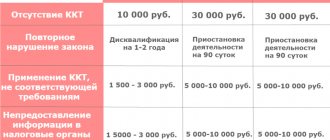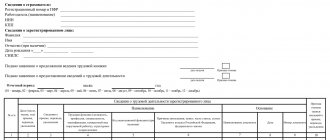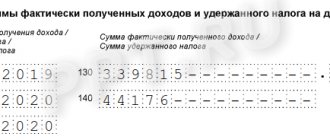Situation No. 6: liquidation and reporting
The organization has begun liquidation proceedings.
It will end in 2020. From 2020, submission of land tax returns will be cancelled. The company has one land plot, which upon liquidation will be transferred to the founder. When the manager submits the liquidation balance sheet to the Federal Tax Service, will it be necessary to attach a land tax declaration to it? Will the tax authority calculate everything itself, and will the company pay? What to do if there is a benefit for a company that employs disabled people? Starting from the 2020 tax period, on the basis of Law dated April 15, 2019 No. 63-FZ, the obligation for organizations to submit a land tax return has been abolished. However, tax benefits for previous tax periods, as well as for the period during 2020 in the event of termination of the organization through liquidation during this period (Clause 3 of Article 55 of the Tax Code of the Russian Federation) are declared in accordance with the previously valid provisions of the law.
In the described case, the 2020 tax period at the time of liquidation will not have fully expired. Benefits during 2020 are declared in accordance with the previously valid provisions of regulations relating to the procedure for submitting land tax returns. That is, it is necessary to submit a declaration.
Similar explanations are given in the letter of the Federal Tax Service of Russia dated September 12, 2019 No. BS-4–21 / 18359.
Changes affecting companies and individuals
In 2020, you need to pay tax only on immovable property value registered as fixed assets (in this part, the legislation has not changed; if immovable property value has the status of a commodity and will be sold in the future, then it is not subject to tax).
If real estate has the status of a commodity and is sold, it is not subject to tax
The cessation of taxation of movable property of companies became the reason for making amendments to the bases of calculation programs and tax amounts, and also changed the sequence of filling out the tax return. For this reason, by order of the Federal Tax Service dated October 4, 2018 No. ММВ-7-21/ [email protected], declaration forms and advance payment calculations were developed taking into account the adopted changes. The new forms will be used from the 1st quarter of 2020. For 2020, a declaration is provided in accordance with the order of the Federal Tax Service dated March 31, 2017 No. ММВ-7-21/ [email protected]
It is important to know! Only the organization is responsible for filling out such a document; citizens (individual entrepreneurs inclusive) do not make such calculations.
The amendments that were made to legislative act No. 302-FZ concern the payment of tax funds by organizations. The elimination of taxation of movable property does not apply to individuals. For them, from January 1, 2020, some provisions of the property tax for individuals will change (amendments were made on August 3, 2018 by Law No. 334-FZ).
The abolition of taxation of movable property does not apply to individuals
The tax amount will be collected from the market value of property in all regions of the Russian Federation.
The reduced coefficient of 0.8 for calculating the tax on the property value of individuals for the fourth year of using the calculation based on the cadastral price was canceled (the change is relevant from 2020 when calculating taxation for 2020).
In comparison with the previous year, a restriction on tax growth was introduced - now the cost cannot be more than 10% of the amount.
It is important to know! If the property owner proves that the market value of his property was determined incorrectly, he will be reimbursed for the entire period of the incorrectly calculated tax.
The amount of taxes depends on the market value of the property
Preferential categories have been expanded, their validity period has been extended, including for children with disabilities - benefits for them began to apply from 01/01/2015 (the Federal Tax Service is obliged to recalculate).
The change, approved on August 3, 2020, reduces the tax burden on property taxation for companies. This technique makes it possible to reduce the amount deducted to the budget for the prescribed tax, which is a positive point regarding the interests of payers. Still, you should not forget about changes in other areas of taxation (including VAT and excise taxes).
What objects will you need to pay tax on in 2020?
Based on paragraph 1 of Article 130 of the Civil Code of the Russian Federation, real estate includes land plots, subsoil plots and everything that is firmly connected to the land, that is, objects whose movement without disproportionate damage to their purpose is impossible, including:
- buildings, structures, unfinished construction projects;
- residential and non-residential premises;
- parts of buildings or structures intended to accommodate vehicles (car spaces), if the boundaries of such premises, parts of buildings or structures are described in the prescribed manner.
Real estate also includes objects subject to state registration: aircraft and sea vessels, inland navigation vessels. The Civil Code of the Russian Federation allows other property to be classified as real estate if it is defined by law (for example, space objects).
- availability of a record about the object in the Unified State Register of Real Estate;
- in the absence of information in the Unified State Register of Real Estate - the presence of grounds confirming the strong connection of the object with the ground and the impossibility of moving the object without disproportionate damage to its purpose.
For example, for capital construction projects, these may be documents of technical accounting or technical inventory of the object as real estate; permits for construction and (or) commissioning; design or other documentation for the creation of an object and (or) its characteristics.
More useful publications:
- New form of declaration 3-NDFL from 2020
- Form of invoice journal from 2020: how did the increase in the VAT rate affect
- What has changed in the list of goods with 10% VAT since 2020
- Additional agreement to the agreement on changing the VAT rate from 2019: sample
- VAT rates from 2020: table
Position of companies until 2020
Previously, contributions to the state were made for any type of property. In 2020, businesses were provided with a tax exemption for movable property. Payments provided for cars and other things of this category could be reduced after the adoption of the relevant regional regulation. Moscow introduced a similar Law: it is known as number 64 and was adopted on November 5, 2003. Article 4 reported on incentives. And, for example, in the Tver region the rate remained at the same level.
But such questions should no longer worry business owners, regardless of the taxation regime used (STS, OSNO and others) or organizational and legal form (JSC, LLC).
Real estate tax
The concept of “real estate” includes property that cannot be moved, because it is tied to a certain territory. This description includes:
- house buildings;
- apartments;
- apartments;
- separate rooms or other residential premises;
- unfinished residential buildings;
- an integral real estate complex, on the territory of which at least one premises is classified as residential;
- garage buildings and parking spaces;
- buildings for household purposes with an area of up to 50 m2, which were erected on the territory of a land plot allocated for building a house or setting up a garden.
Next year, the tax will be calculated from the cadastral value, and not from the inventory value, as at present. The downside is that the cadastral value is sometimes overestimated, and, therefore, taxpayers will have to pay large sums. But there is no need to panic ahead of time, since a significant increase in the rate will primarily affect owners of luxury mansions and luxury real estate, the value of which exceeds 300 million rubles. For such properties a 2% rate will be applied. For average houses and apartments, the rate will not exceed 0.3% of the cadastral value of the property.
USEFUL INFORMATION: List of documents confirming the right to inheritance
Historical development of the issue
Not all countries subject movable property to taxation. Even the terms of movable and immovable objects are different for the Russian Federation and foreign countries. For example, in the Russian Federation, airplanes are considered immovable property, but abroad, even taking into account the impressive cost of airplanes, they are usually considered movable property, so there is no tax on them.
In Russia, foreign practice was used, and the movable property tax was abolished
Foreign practice was used when the decision to abolish taxation on movable property was developed. In fact, in 2013, preferential conditions were introduced for this tax levy. Then, in 2020, revisions were made to ensure that related party benefits could no longer be used. Prescribed in paragraph 25 of Art. 381 of the Tax Code of the Russian Federation, the benefit paid for movable property is not taken into account when receiving (purchasing) property from an interdependent person.
Persons have the status of interdependent (according to clause 1 of Article 105.1 of the Tax Code of the Russian Federation), if the nuances of their relationships have the ability to influence the conditions and (or) results of transactions carried out by these persons, and (or) the results of the economic activities of these persons or the activities of persons by their representation.
Excerpt from Article 105.1 of the Tax Code of the Russian Federation
Typically, interdependent persons are considered to be:
- enterprises, in a situation where one enterprise directly and (or) indirectly participates in the activities of another enterprise, and this participation constitutes a share of more than 25%;
- an individual and an organization when this individual directly and (or) indirectly participates in such an organization, and this participation constitutes a share of more than 25%;
- organizations in a situation where the same person directly and (or) indirectly participates in these organizations, and the share of such participation for each organization is more than 25%;
- an enterprise and a person who has the rights to appoint (elect) a sole executive body of this enterprise or to appoint (elect) at least 50% of the composition of a collegial executive body or board of directors (supervisory board) of this enterprise; other persons established by current law.
Previously, the benefit paid for movable property is not taken into account when receiving (purchasing) property from an interdependent person
In 2020, taxation on movable objects returned. The tariff on the basis of which tax payments are collected is 1.1%, but regional governments have the right to change the interest rate at their discretion, without exceeding the specified rate. In some places taxation has been abolished, in others the percentage has been reduced for everyone, but usually local organizations are divided into certain categories. As a result, some pay the tax in full, others are exempt from payments, and still others pay the tax at a reduced rate. It can be concluded that tax collection takes place differently in different regions. The disadvantages of returning taxation on movable property include the loss of relevance of fundamental organizational funds and lack of investment. The same economic result is a consequence of the limitation on the transfer of losses to the future in the amount of 50%. It was expected that in 2020 the interest rate of this taxation would double.
That is why, from 2020, taxation on movable property has been completely abolished, which has greatly simplified the life of accounting employees of large Russian companies. The main disadvantage of the tax on movable property is its extremely complex calculation - this problem has been eliminated in 2020.
Since 2020, taxation on movable property has been completely abolished
USEFUL INFORMATION: How to terminate an alimony agreement?
Conditions for receiving relief
In order for a company to take advantage of the innovation and receive tax exemption, the object must meet the following conditions:
- fall under the characteristic of “movable property”;
- not be treated as an exception, that is, not be property for which cancellation is not provided;
- not be on the balance sheet of the enterprise's fixed assets;
- property acquired after 2012, except for that transferred during reorganization or liquidation;
- the property does not act as the property of the taxpayer, which was acquired through a transaction with a related party.
Tax breaks do not apply to railway rolling stock, even if the company acquired it after 2012.
Important! The new tax exemption system will not affect everyone. For now, we will talk about some companies located in the constituent entities of the Russian Federation, since the initiative to implement the new law has been transferred to the heads of the regions.
What is considered movable property?
Tax officials indicated that the legal grounds for classifying an object as movable or immovable property must be determined by the norms of civil legislation on the conditions for recognizing a thing as movable or immovable, in particular by the norms of Articles 130-131 of the Civil Code of the Russian Federation.
Movable property
- this is property whose parameters do not allow it to be classified as real estate. A characteristic feature of such material assets is the possibility of their transfer from one individual to another.
Legislative: Articles 130-131 of the Civil Code of the Russian Federation
READ ON THE TOPIC:
1. Immovable things (real estate, real estate) include land plots, subsoil plots and everything that is firmly connected to the land, that is, objects whose movement without disproportionate damage to their purpose is impossible, including buildings, structures, unfinished construction objects. (as amended by Federal Laws dated December 30, 2004 N 213-FZ, dated June 3, 2006 N 73-FZ, dated December 4, 2006 N 201-FZ).
Immovable property also includes aircraft, sea vessels and inland navigation vessels subject to state registration. The law may classify other property as immovable property. (as amended by Federal Law No. 216-FZ dated July 13, 2015) Real estate includes residential and non-residential premises, as well as parts of buildings or structures intended to accommodate vehicles (parking spaces), if the boundaries of such premises, parts of buildings or structures described in the manner established by the legislation on state cadastral registration. (paragraph introduced by Federal Law dated July 3, 2016 N 315-FZ)
2. Things not related to real estate, including money and securities, are recognized as movable property
. Registration of rights to movable things is not required, except in cases specified in the law.
Thus, in accordance with the explanations of the Federal Tax Service of Russia, a taxpayer-legal entity, in order to confirm that it has grounds for classifying an object of property as real estate, must prove to the tax authority the presence of the corresponding signs. Among these, tax authorities will take into account such circumstances as:
- the presence or absence of a record about the property in the Unified State Register of Real Estate;
- in the absence of such information in the register - the presence or absence of a strong connection with the land;
- the impossibility of moving an object without causing great damage to its purpose.
In particular, with regard to capital construction projects, tax authorities will request from taxpayers:
- documents of technical accounting or technical inventory of an object as real estate;
- building permits;
- permits for commissioning;
- design or other documentation for the creation of a real estate property;
- information about its characteristics.
As the Federal Tax Service of Russia reports, in addition, during a tax audit of corporate property tax reporting, tax inspectors can conduct inspections, order examinations, attract specialists of the required profile, and demand documents and (or) information from taxpayers. True, only if there are and within the framework of the grounds provided for by the Tax Code of the Russian Federation.
How will the reporting form for property tax 2020 change?
The Federal Tax Service has already developed new reporting forms for corporate property tax. New forms were approved on October 30 under the number No. ММВ-7-21/ [email protected] All data on fixed assets related to movable property was removed from the reporting. There is no need to include data on movable property in the reporting.
The order of description of real estate objects has been changed. For example, for a property that does not have a cadastral or conditional number, you will need to indicate a detailed address.
The new forms will come into effect in reporting for 2020.
“Immovable” will have to be proven?
Data for classifying objects as real estate for legal entities must be provided to the tax authorities. This is also stated in the explanatory letter of the fiscal service. Its employees will be guided by the following signs:
- Is there a corresponding entry about the property in the Unified State Register of Real Estate?
- How firmly is the building connected to the land plot if there is no entry in the state register about it as an immovable object.
- It will be possible to move material assets to another place without causing serious harm to their purpose.
Based on the totality of the listed signs, a decision is made. Taxpayers will be required to provide the following documents upon request of the regulatory authority:
- Construction permits, commissioning of the facility.
- Documentation on technical accounting and inventory.
- A project agreed upon and approved in accordance with the procedure established by law.
- Information about the technical characteristics of buildings and structures.
USEFUL INFORMATION: What you need to receive an inheritance in Ukraine
It is important for taxpayer enterprises to understand that additional inspections are a selective measure. They are carried out only in cases where there are grounds clearly specified in the Tax Code
Movable property tax
Movable property includes vehicles, securities, money, equipment, etc. Since such property is often used to make a profit, this tax is paid by legal entities. The rate is determined by the regional authorities, but should not exceed 1.1%.
However, quite recently the Ministry of Finance submitted to the Government of the Russian Federation a bill to abolish this type of tax. In one of the readings it was approved, therefore, it is possible that as of January 1, 2020, legal entities will be exempt from payment.
Transport tax
Today's conversation would be incomplete without mentioning transport tax. Both individuals and legal entities are subject to it. Currently, the rate is determined by the power of the car. However, the Ministry of Transport of the Russian Federation is talking about the amount depending on the environmental friendliness of the vehicle. At the same time, it is planned to establish a single rate for all regions of the country; the exact figure has not yet been announced. Presumably, owners of cars produced according to Euro 4, 5 and 6 standards will be exempt from payment.
Who paid tax before?
Until 2020, the tax on movable property was paid only by companies in some regions of the country. The exception was payers of special tax regimes represented by UTII and the simplified tax system. Simplified people did not even pay property taxes if their properties were not included in special cadastral lists.
A fee of 1.1 percent of the value or size of movable property was paid. But now organizations are completely exempt from this type of fee. This significantly reduced the tax burden on enterprises.
Which regions were taxed?
In which regions was the fee paid?
Only in some regions of the country this type of tax was paid. It was the regional authorities who determined the terms and rules for transferring funds. Additionally, companies were established at the local level that could count on benefits or other types of concessions when paying this fee.
Until 2020, the levy on movable property was in effect in the Republic of Adygea and Altai, as well as in the Amur, Kursk, Oryol, Moscow, Smolensk, Tomsk, Sakhalin, Omsk, Novosibirsk, Kemerovo and Tambov regions.
Companies had to independently contact the Federal Tax Service branches to obtain information about the need to pay this type of fee. Tax service employees additionally reported what tax rate applies, when exactly funds need to be transferred, as well as which enterprises have the right to apply for benefits.
When is canceled
It has been canceled since the beginning of 2020 for all regions of the country. Therefore, businesses must now calculate and pay property taxes exclusively. The concept of tax on movable property was completely removed from the Tax Code.
Cancellation of movable property tax from 01/01/2019:
Therefore, companies now have to worry about paying less taxes. This is especially true for organizations operating under the general taxation regime. Such positive changes in legislation have led to a reduction in the tax burden for many large firms.
Cancellation of movable property tax from 2020
The tax base in 2020 is recognized as both movable and immovable property, with the exception of (clause 4 of Article 374 of the Tax Code):
movable property classified in groups I-II of the classification of fixed assets;
the cost of acquired land plots;
nuclear equipment, installations and storage facilities;
icebreakers and ships with nuclear and nuclear installations;
federal property used for defense and state security, law enforcement by military and equivalent services;
historical sites recognized as cultural heritage;
ships listed in the Russian International Register of Ships.











